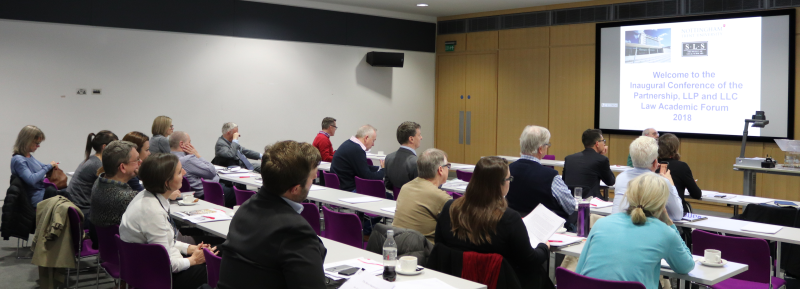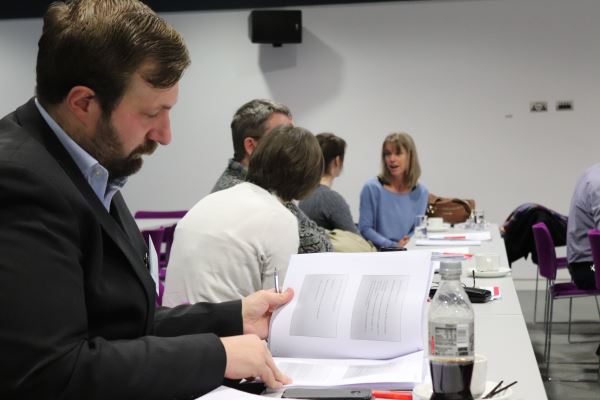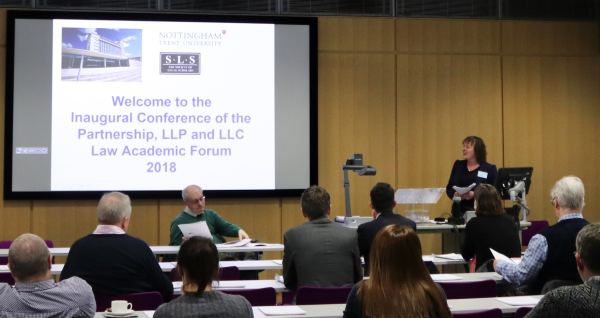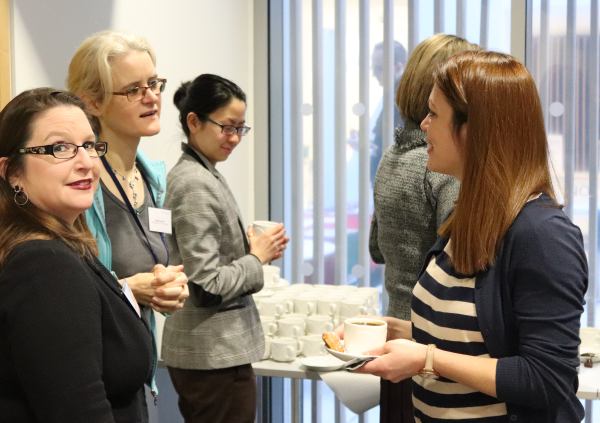

The Inaugural Conference of the Forum, which was generously supported by the Society of Legal Scholars (SLS) Small Projects and Events Fund, and by Nottingham Law School, attracted over thirty registered delegates including academics specialising in law and business from UK, Australian, US, Dutch and Italian universities, solicitors, barristers, tax advisers and students. It comprised four sessions where papers were presented followed by questions, and finished with a round table discussion on the future of the Forum.

In the first session, Professor David Milman (Lancaster University) spoke on the problems of identifying when and whether a partnership exists. He considered the issues which trigger litigation on identification (including the desire of purported partners to claim a share of the partnership assets or profits). After discussing the limited guidance provided by the Partnership Act 1890 and a wide range of recent cases, he considered alternative non-partnership based claims, before concluding that reform is unlikely but the courts are experienced in dealing with characterisation issues across a range of other areas of law. Jonathan Hardman (University of Glasgow, and Dickson Minto) presented the results of an empirical study of the potential moral hazard of limited liability by reference to Scottish partnerships which had converted to LLP status, using evidence from publicly available records at Companies House. The research focussed on the potential risk indicators, including the granting of floating charges, delays in registering accounts, changes in drawings, and increases in liabilities. The results suggest that LLP status might lead to some increase in risk taking but that in many cases it improved the firm’s position by making membership more attractive.

In the second session, Professor Geoffrey Morse (University of Birmingham) considered whether a partner can also be an employee of the partnership with particular reference to the Supreme Court judgment in Clyde & Co. He first discussed the reasons for the incompatibility of the two statuses according to both partnership and employment law cases, and then examined whether a partner should be considered to have the capacity to be an employee. He argued that the dual capacity point was not the reason for the incompatibility but the impossibility of employment co-existing with the nature of the partnership relationship. Jason Ellis (Nottingham Trent University) then presented a paper on whether directors should be accorded employment rights, with particular reference to claims made by directors of insolvent companies against the National Insurance Fund. He examined the difficulty of reconciling separate legal personality with any attempt to consider the reality of the director’s status, particularly where the director is the sole director and sole shareholder.

In the third session, Professor Iris Wuisman (Leiden University) discussed current proposals in the Netherlands to reform partnership law. She noted that the traditional distinction between professional and non-professional partnerships would remain, but there would be consolidation of the relevant laws, and changes to (though not necessarily simplification of) the complicated distinctions drawn between equal liability for certain types of claim, and joint and several liability for others. The slides are available at http://www.partnershiplawforum.org/downloads/PresentationWuismanNottingham5April2018.pdf. Professor Marco Speranzin (University of Padua) gave a detailed overview of the different types of partnership available under Italian law and their key features, noting differences when compared to the position in certain other European jurisdictions including the UK, in particular regarding partners’ liability and amendments to the partnership agreement. The updated slides are available at http://www.partnershiplawforum.org/downloads/ItalianPartnershipsSlides5April2018.ppt.
In the fourth session, Brett Freudenberg (Griffith University) discussed the international trend towards new business forms (such as the UK LLP and US LLC) offering limited liability, separate personality and tax transparency. He highlighted the importance of structures enabling flexibility in both partner contributions and drawings, but noted the risk of this flexibility distorting the taxation outcomes. The slides are available at http://www.partnershiplawforum.org/downloads/FreudBordenDistFlexAndTaxFlowThrough.ppt. Professor Brad Borden was unable to attend due to illness but provided Conference delegates with a draft of his paper on contribution-default remedies.

The round table discussion which concluded the event considered:
1) Publication of Conference papers in a special partnership edition of the Nottingham Insolvency and Business Law Journal, including the possibility of producing a hard copy of the edition (normally only available online).
2) The future of the Forum:
a) The success of the Conference, both in terms of the quality of papers and the opportunity to meet colleagues working in this area of law, prompted calls to make the Conference an annual event if possible. Ideas for the future included practitioner speakers, seeking sponsorship from partnership insurers, approaching law firms to host the event, and asking a PhD student to act as Secretary of the Forum and thus of the Conference.
b) The value of the Forum website as a knowledge exchange mechanism was noted. Ideas for development included separate sections for particular jurisdictions or themes, and a change of the Forum name in order to make it clear that practitioners were welcome to participate.